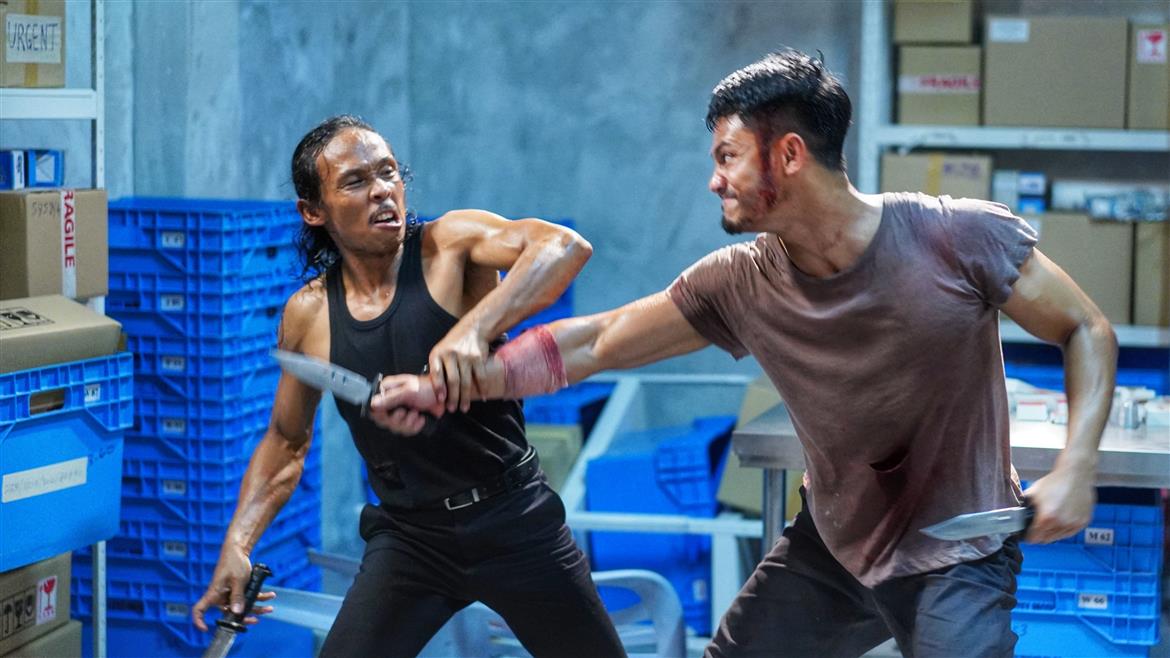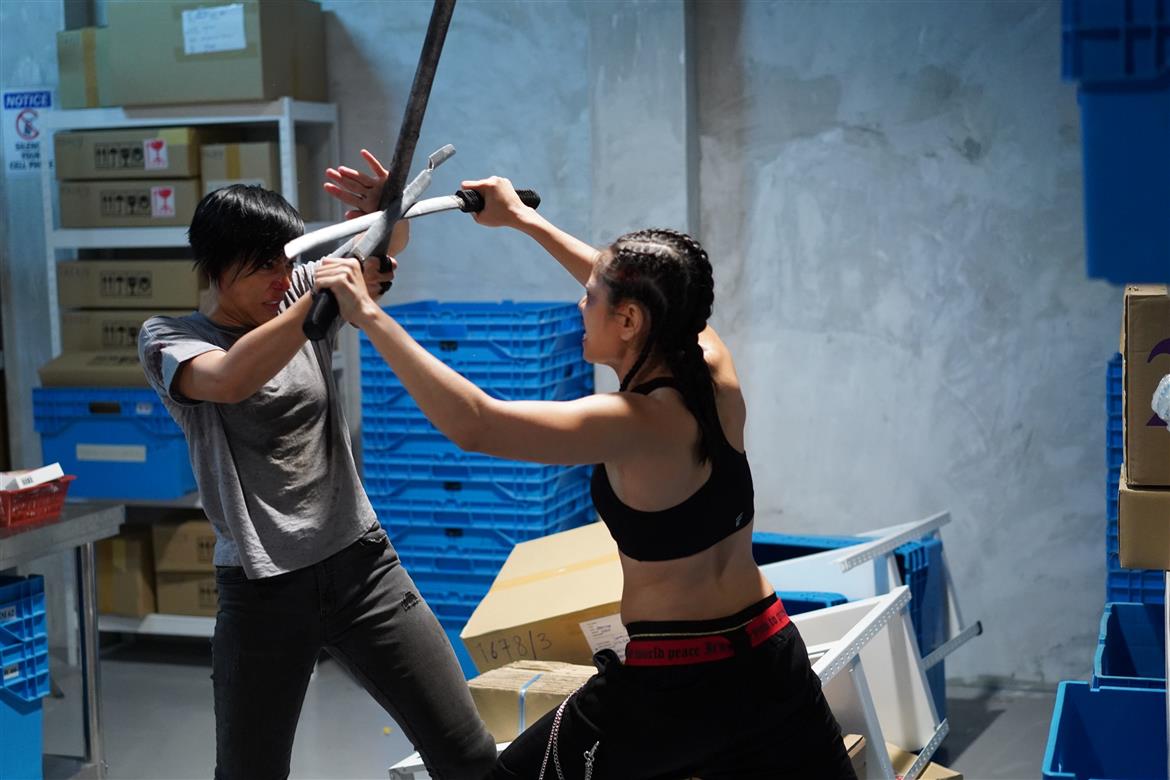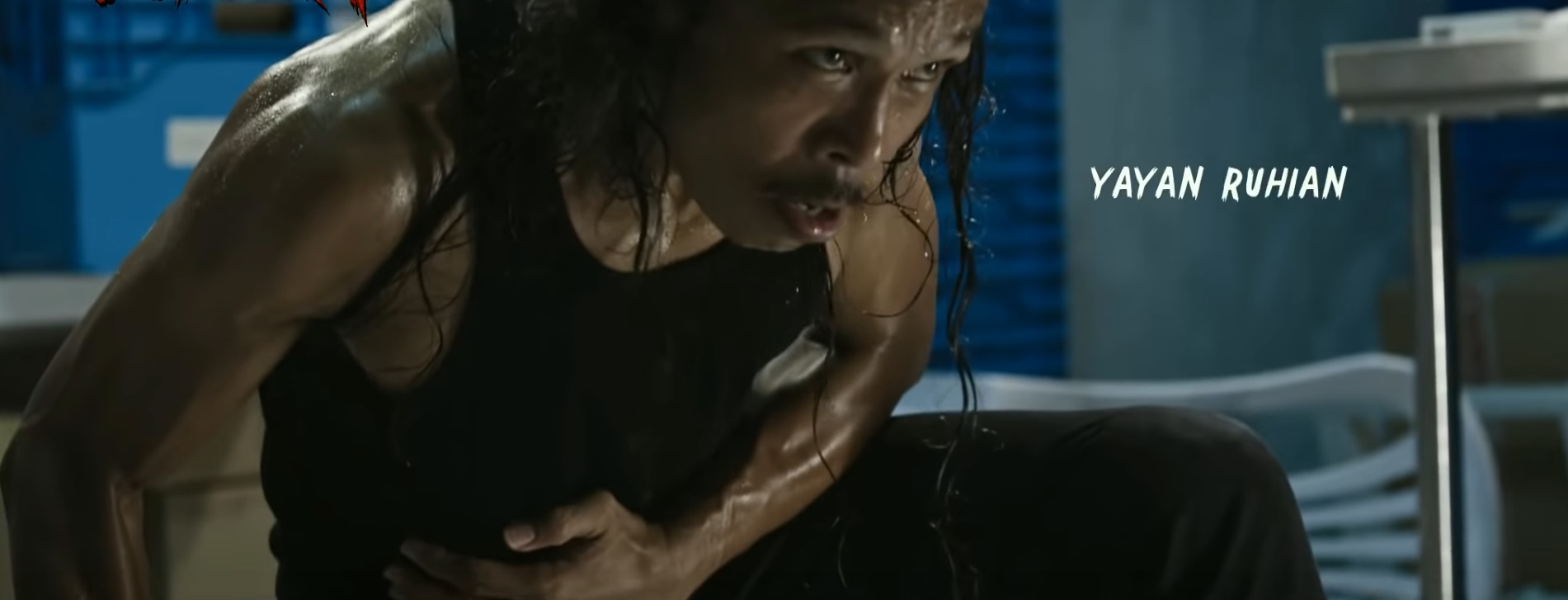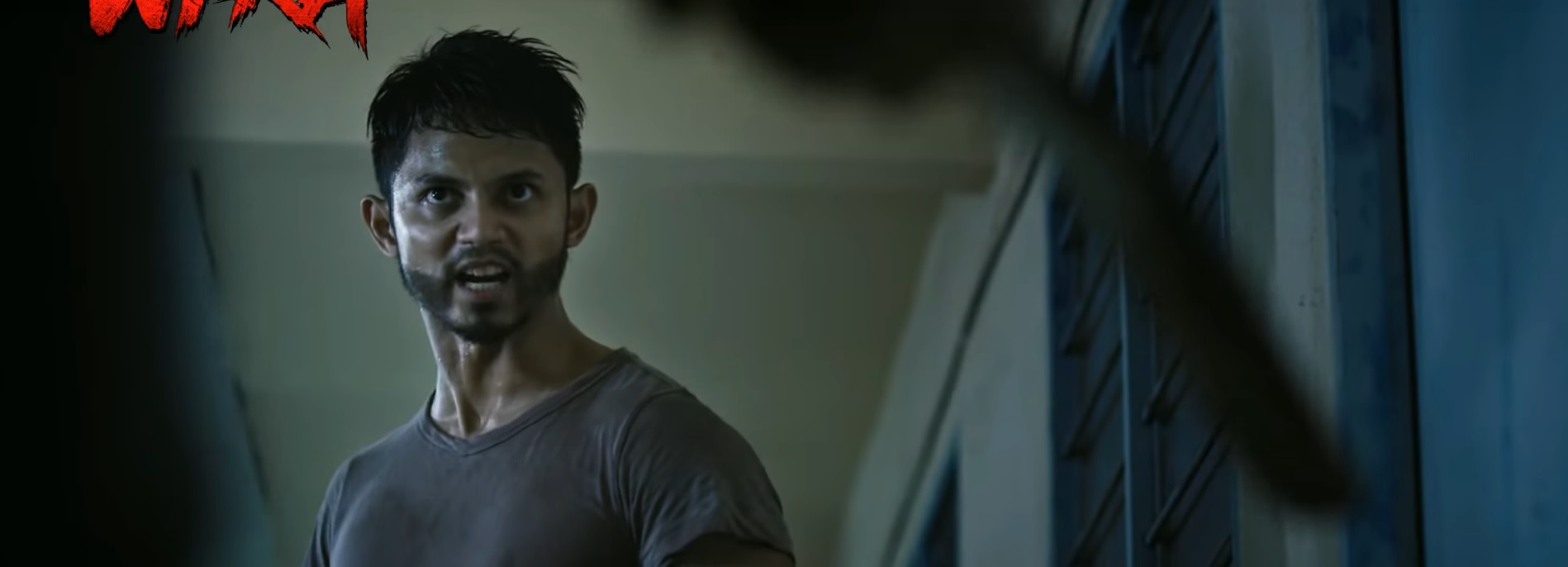Gareth Evans’ Indonesian film, The Raid is goddamn brilliant. An undeniable, batshit crazy modern-day action classic that is flawlessly choreographed, wonderfully framed and moves forward at such a ferocious pace that by the end of it you’re left on your knees, mouth gaping, completely exhausted, yet thirsting to experience it all over again. It opened the eyes of the world to Indonesian cinema and the glorious artistic violence its capable of producing and has since become the holy testament that which striving action directors worship and draw inspiration from. One of those directors, I think, is Adrian Teh (Paskal) whose latest film Wira aspires to reach the heights of the Indonesian masterpiece. And dare I say, there are moments where it almost succeeds.
Like The Raid, the plot is simple and videogame-esque. There is a mob boss (Dain Said, chewing the scenery in every frame he’s in) who has enslaved the residents of a small low-cost flat complex. Everybody works for him — 20 hours a day, 7 days a week, we’re told — in a condom factory that doubles as a drug lab and also has a bar and an MMA arena, both of which are neon-drenched. The mob boss’ name is literally Raja and this is his kingdom. Even the cops can’t touch him. Very few who work for Raja have managed to break free of his proverbial shackles.

One of whom who has, is Munas (Hairul Azreen), a good looking dude with a boyish charm who can also kick everybody’s ass including the audience’s. After serving a few years in the military, he has now returned to convince his sister and dad to leave the crap hole of a place they call home. The pickle is, the sister (Fify Azmi) owes The King a massive debt and Raja, being the massive prick that he is, has no plans of letting her go. When words of pleas don’t work, Munas and his sister (also an unstoppable ass-kicker) use their fists and legs to do the talking in a bunch of high-octane action sequences that are the best to come out of Malaysian cinema.
Adrian Teh has said that he was so obsessed with crafting next-level action sequences that he even had dreams about it. “In my dream, someone punched me as I was walking down the street.” He said. “But my reaction was to ask the person to hit me again because the angle of his punch was quite interesting.” I believe him, because my god, are the set pieces really good. It starts with a 1-on-1 fight in the ring. Later in a nice little callback, protagonist brother & sister take on antagonist brother & sister in the same ring as a bunch of bloodthirsty onlookers cheer them on.
Then there’s a 2-on-10 fight and of course, a 2-on-bajillion blazing battle where in a nod to The Raid, the protagonists have to run down their flat building, as hordes of bad guys keep coming at them fast and furious, carrying weapons and screaming their lungs out. They’re basically just punching bags for our protagonists to destroy with relative ease and show off their insane martial arts skills like the f*cking badasses that they are. But the good guys take hits too — they get whacked and stabbed and show signs of vulnerability.
The martial arts fights sometimes involve knives, machetes and sticks, other times they’re just good old fashioned pummeling fisticuffs. Rarely do they involve guns, though, because why use firearms and ruin the fun when you can break bones and smash people’s heads through windows and walls. No, I’m not being sarcastic. Every single fight is superbly choreographed by the legendary Yayan Ruhian (Mad Dog from The Raid), who plays Raja’s head of security AKA the Level 99 Boss, who’s so badass, he at one point tosses a knife to our protagonist as if to say “come at me, bro.”
But Adrian Teh doesn’t just place the camera flat on a tripod and let the choreography do the talking. He moves it in interesting ways, switching between tight shots, wide shots and unorthodox angles. The takes are long and steady and he never cheats using headache-inducing shakes or quick cut jagged editing. His sharp eye for action direction is showcased magnificently during the set-piece that takes place in a moving bus. He makes us feel the tightness of the vehicle, glides the camera outside for us to witness the multiple things that are happening at once, before seamlessly floating right back into the thick of it.
What prevents the action sequences from attaining true greatness, is that it lacks a certain level of blood-soaked, no holds barred hyperviolence. A film like this becomes infinitely more visceral and pulsating if the wall-to-wall fights are not just fun, but brutal in a way that’ll make you scream ‘HOLY SH*T!’ out loud seven times in a row; If the heads don’t just get put through the walls but smashed and reduced to a pulpy mess. But that’s a minor gripe and the least of the film’s issues.
Because my word, despite showering the film’s action scenes with so much praise, Wira is not a great film, nor is it a very good one. The problem is, it doesn’t have the same relentless and ruthless forward momentum that the likes of The Raid and Mad Max: Fury Road thrive on. It has too much downtime. Downtime that is uninteresting. Downtime that is unengaging. Downtime that’s void of thrills and lacking in dramatic tension. What we get instead is melodramatic cheese that accentuates all of Adrian Teh’s weaknesses to an astronomical degree — the same cheese that made my toes curl watching Paskal.
At the very least, the cartoonish patriotic pandering made sense in Teh’s previous outing that centres around the Malaysian Navy Seal. Here, the moral posturing is jarring. Why couldn’t the film just be about a couple of oppressed individuals fighting back against their oppressor and snapping the bones of everybody who gets in their way? Wira ends with a bang. But the mind-numbing epilogue that sees the badass chick with short hair and a sick fade now all covered up, accompanied by a tacky Nationalistic voice-over (aimed squarely at the audience) is an eye-roller. In an attempt to get serious, Wira wallows in melodrama.
The arguments that take place between brother, sister and father are straight out of RTM telenovelas. There’s also a dull and fuzzy backstory about the protagonist’s dead mother that repeatedly tries but fails to tug at your heartstrings. First-time actress Fify Azmi has a fantastic physical presence (she’s great in the scene where she’s forced to get on her knees and eat dog food and her best character moment comes when she swiftly pins her brother against the wall with her leg, in their living room) but every time she’s forced to deliver lengthy ‘mother-sentiment’ dialogue, it becomes cringy. Teh’s lines which feel like they’re right out of the dubbed version of Naruto, do not help. When smaller character moments are done right in action flicks, they add layers of emotional and personal stakes. When they’re done wrong, they become intrusive, bringing the movie to a screeching halt. In the case of Wira, I could smell the burnt rubber and disintegrated brake pads by the end of it. Which is a damn shame.
That said, I can’t wait to see what else Adrian Teh dreams up. As an action director, he’s dripping with infinite potential. Wira has some of the best moments of pure action I’ve seen all year, remarkably choreographed and inspiringly photographed, not just by Malaysian cinema standards but globally. It’s everything else that’s sandwiched in between that falls flat. Perhaps his next film will be a raw and manic action piece that’s ruthless in momentum and is absent of cheesy melodrama and cringy moral messaging. One can hope!
Wira hits cinemas this 21 November 2019.
Follow us on Instagram, Facebook, Twitter or Telegram for more updates and breaking news.






